Iran Claims Gas Export Revenue Of $4 Billion In Four Months
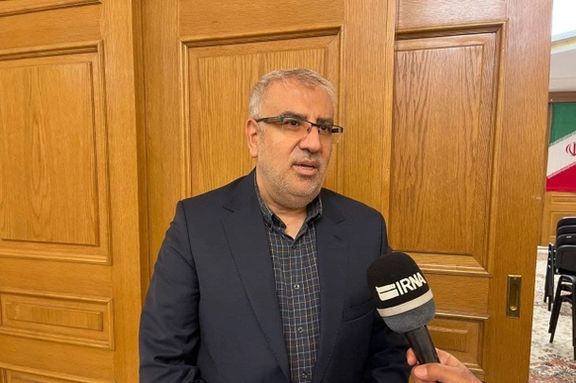
Iran's gas export revenue for the first four months of the Iranian year (March 21 to July 21) reached almost $4 billion, local media quoted Oil Minister Javad Owji as saying on Wednesday.

Iran's gas export revenue for the first four months of the Iranian year (March 21 to July 21) reached almost $4 billion, local media quoted Oil Minister Javad Owji as saying on Wednesday.
The country sits on the world’s second-largest gas reserves after Russia, but years of various international sanctions have prevented the technological development of its gas export sector.
"We have collected close to $4 billion of gas exports for the first four months of the year, which is nearly as much as what was collected for the entire previous year," Owji said.
On Tuesday Iran made a claim that its oil export revenues climbed by 580 percent from March 2021 to March 2022, although other government data show little revenue flowed into its treasury. Iran’s high inflation and a falling currency keep the economy in a crisis.
Iran mainly exports gas to Turkey and Iraq, but its delivery has not always been reliable due to debt-payment issues with Baghdad, Iran's own domestic consumption needs, and occasional technical problems which forced a momentary halt in exports to Turkey over the winter.
The Iranian government says it has found ways to repatriate funds from earlier energy exports and reached an agreement to resume gas supplies to Iraq in April as Baghdad paid part of its debts owed to Tehran.
Global gas prices have risen almost fivefold in 2022 and it is possible that Iran earned one billion dollars a month, although last year its gas exports totaled $4 billion.
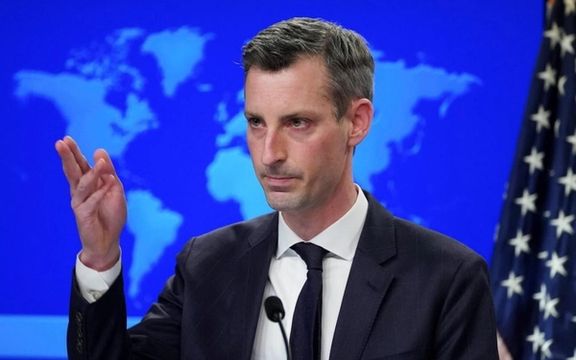
The United States says it is reviewing a draft understanding on reviving Iran’s nuclear deal that has been tabled by the European Union.
In his daily briefing on July 26, State Department spokesperson Ned Price said that “we are reviewing the draft understanding on mutual return to full implementation with the JCPOA that the high representative shared with us, as well as with Iran and the other JCPOA participants,” referring to a draft agreement by Josep Borrell, the EU high representative for foreign affairs and security policy.
About the proposal being fully acceptable to the Biden administration, he said “this new text” that Borrell referred to [in an op-ed] is based on “an outline of what we believe to be a good deal on the table since March that we have been prepared to accept.”
In an article published by the Financial Times on Tuesday, Borrell said there is “no other comprehensive or effective alternative within reach,” stressing the need for swift political decisions.
“We are studying the changes that have been proposed by the EU; we’ll respond to them in short order. And we hope that Iran finally and ultimately decides to seize the opportunity that has been before it for some time now,” he added.
Dodging a direct answer about any definite timeframe or deadline on the talks to restore the deal, Price said that “we are going to continue to pursue a mutual return to compliance with the JCPOA for as long as it’s in our interest to do so. That remains the case."
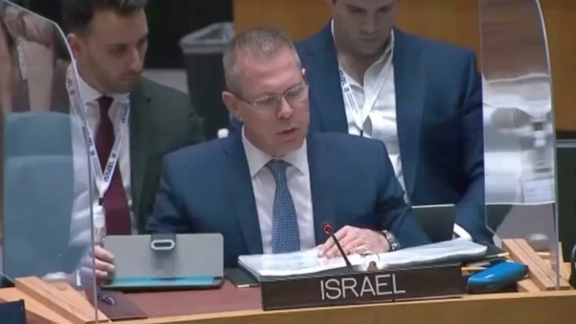
Israel’s envoy to the United Nations told Iran International that Tehran is continuing its violations of its international commitments and is getting closer than ever to a nuclear state.
Gilad Erdan said on the sidelines of a UN Security Council session that Iran is enriching uranium almost to military-grade, noting that “This is a clear threat to the security of our region and to the whole world. It needs to be addressed by this Security Council, and this Council is silent.”
Criticizing the UN Security Council’s for inaction against Tehran, he said during his address to the council, “when it comes to the situation in the Middle East everyone knows that the biggest threats to the region is the nuclearization of the radical Ayatollah regime in Iran as well as its terror funding and hegemonic ambitions.”
In an opinion piece published by the Time on Monday,former Israeli Prime Minister Ehud Barak said the efforts to block Iran from turning into a nuclear power are apparently headed for failure.
Echoing US Secretary of State Antony Blinken’s remarks eight months ago that if an agreement is not achieved within weeks, it might not be worth signing, he said that “That’s even more true today” as Iran “kept enriching uranium and has turned from a country that Russia was assigned to monitor into a country supplying Russia with armed drones.”
Defense Minister Benny Gantz said Tuesday that Israel has the ability to stop Iran’s nuclear development or merely delay it, noting, “Iran is a global problem. It is not just Israel’s private problem.”
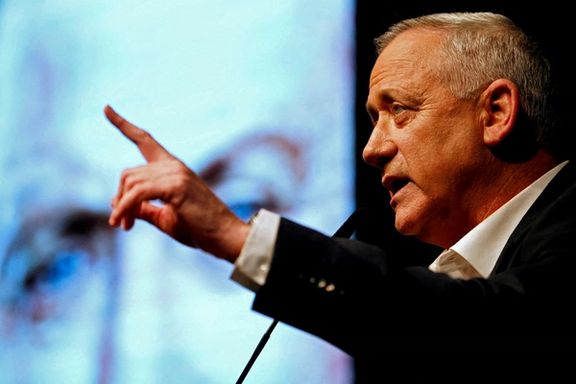
Former Israeli Prime Minister Ehud Barak says the efforts to block Iran from turning into a nuclear power are apparently headed for failure.
In an opinion piece published by the Time on Monday, Barak said the nuclear agreement – or the JCPOA – failed to delay Iran from having enough highly enriched uranium for nukes, and the 2018 US withdrawal from that same agreement allowed Iran to "legitimize” its progress toward "threshold nuclear" status. “In 2018 they were some 17 months away from that threshold. Today they are probably just 17 days away.”
Echoing US Secretary of State Antony Blinken’s remarks eight months ago that if an agreement is not achieved within weeks, it might not be worth signing, he said that “That’s even more true today” as Iran “kept enriching uranium and has turned from a country that Russia was assigned to monitor into a country supplying Russia with armed drones.”
Describing a new agreement as mainly aimed at keeping for appearances, he said such a deal provides “both sides a ‘denial umbrella’ for domestic needs — for the US, avoiding tougher realities and choices, and, for the Iranians, keeping sanctions at the lightest level possible.”
Noting that Iran will turn into a de-facto threshold nuclear state this summer, he said, “Both Israel and (for sure) the US can operate over the skies of Iran against this or that site or installation and destroy it. But once Iran is a de-facto threshold nuclear state this kind of attack simply cannot delay the Iranians from turning nuclear.”
Defense Minister Benny Gantz said Tuesday that Israel has the ability to stop Iran’s nuclear development or merely delay it, noting, “Iran is a global problem. It is not just Israel’s private problem.”

Iran said Tuesday its income from oil exports is up 580% in the first four months of the Iranian year (March 21-July 21) compared with the same period a year ago.
It is not clear how much the volume of crude oil and condensates exports increased, as Tehran keeps oil exports a state secret due to US third-party sanctions that can penalize companies involved in transactions. Global oil prices rose almost by around 50 percent from March 2021 to March 2022, the first full month after Russia’s invasion of Ukraine.
But Iran's claim of a 580-percent rise in revenues is hard to explain. In early July the Supreme Accounting Office reported that from March 21 to May 20, the government was able to realize just 15 percent of projected oil revenues. Although some revenues might not have officially enetred government coffers, but the Tueday claim of a 580-percent increase in revenues just does not add up.
Reports have indicated that the highest month for Iran’s exports was January 2022, when it shipped close to 1.1 million barrels per day (bpd), but have retreated to around 700-800 thousand of bpd, after Russia began shifting cheaper crude exports to China, Iran’s main customer.
Another unknown is how much Iran receives in cash in lieu of the oil shipped to China, Venezuela or Syria. Iran can say that oil revenues increased, but it is not clear if it receives cash payments for all shipments. Some observers have said that a lot of barter takes place, given the difficulty to make banking transactions given that the United States has also sanctioned Iran’s international banking ties.
The Iranian government has said in recent past that it has found ways to repatriate funds to its treasury from energy exports, but when billions of dollars are concerned that is not an easy task when a country is under sanctions and all large international banks would shun any business.
Aside from barter, Iran might be keeping its funds in the accounts of front companies and individuals in Asia and in the Persian Gulf countries and using it to finance essential imports. This involves a lot of extra payments to middlemen, illicit bankers and other expenses that some Iranian officials have put at 25 percent of total foreign trade.
Iran’s oil exports had dropped to less than 300,000 bpd in 2019, after the United States pilled out of the 2015 nuclear agreement the year before and imposed sanctions. Exports began to pick up in the end of 2020 after it became clear that the new administration wanted to revive the nuclear deal, which would mean lifting sanctions. In 2021, Iranian oil shipments more than doubled, reaching to around 750,000 bpd.
Despite these higher exports and claims of rising revenues, Iran economic situation has gotten worse since August 2021, when hardliner President Ebrahim Raisi came to office. Iran’s currency has dropped further to near all-time lows and annual inflation has jumped form 40 to 55 percent, according to official figures. Prices of essential food staples have doubled and tripled since May, when the government ended food import subsidies.
Critics in Iran ask where the higher revenues are as it seems the country still is not exporting more oil. The answer to this question is difficult given all the secrecy, but years of poor economic performance have undercut domestic investments and confidence in the future.
Just recently, central bank figures indicated that while oil exports had brough in an extra $17 in March 2021- March 2022, around $9 billion left the country.
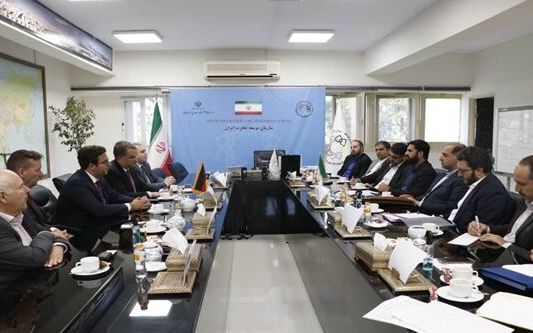
Iran says German businesses seek to expand their activities in the Islamic Republic through participating in Iranian trade exhibitions.
Chairman of the Board of the German Federal Association for Economic Development and Foreign Trade (BWA) Michael Schumann attended a meeting with Iranian lawmaker Ehsan Ghazizadeh Hashemi and Iran's ambassador to Germany Mahmoud Farazandeh as well as Alireza Peyman-Pak, the head of Iran’s Trade Promotion Organization on Tuesday.
According to the Iranian government’s website IRNA, Schumann said trade relations with the Islamic Republic can be expanded regardless of political issues. He welcomed the establishment of the Iranian trade center in Berlin, and called for allocating more space to German businessmen at expos in Iran.
The report quoted him as saying that sanctions imposed on the Islamic Republic have proven to be more detrimental to the German businessmen than their Iranian counterparts.
On July 21, the British ambassador to Iran also highlighted business opportunities to boost UK-Iran trade regardless of the result of the talks to restore the 2015 nuclear talks, known as the JCPOA (Joint Comprehensive Plan of Action). “Just back from Shiraz with our Trade Team... Plenty of great companies in Fars, with opportunities for quality UK products & services to boost UK-Iran trade, JCPOA or not,” Simon Shercliff tweeted.
Asked during a briefing about the British Ambassador’s remark, Spokesperson Ned Price referred to shared goals with European allies to uphold US sanctions until there is anuclear agreement with Iran.